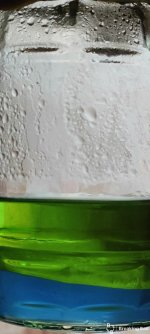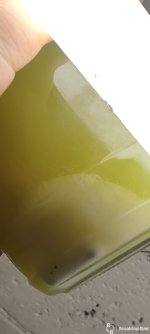- Language
- 🇺🇸
- Joined
- Oct 17, 2024
- Messages
- 3
- Reaction score
- 1
- Points
- 3
how do you know reaction 2b4mp with methylamin is over?
- Language
- 🇺🇸
- Joined
- Feb 21, 2023
- Messages
- 61
- Reaction score
- 26
- Points
- 18
layer separation + a slight color change
↑View previous replies…
- Language
- 🇺🇸
- Joined
- Oct 17, 2024
- Messages
- 3
- Reaction score
- 1
- Points
- 3
- By norivotset69
- Language
- 🇺🇸
- Joined
- Feb 21, 2023
- Messages
- 61
- Reaction score
- 26
- Points
- 18
Sorry for the late reply
In the first photo, you can see the freebase oil on top. You need to extract it with apolar solvent (like benzene here but you could use EtOAc too by example).
Seeing the photos, I think you are talking about steps 2 and 3 not 1-2. If you added the acid already, then this "residue" is mostly mephedrone. If you didn't yet it's quite strange. Could be unreacted 2B4M but that's a lot.
When did the precipitate formed ?
In the first photo, you can see the freebase oil on top. You need to extract it with apolar solvent (like benzene here but you could use EtOAc too by example).
Seeing the photos, I think you are talking about steps 2 and 3 not 1-2. If you added the acid already, then this "residue" is mostly mephedrone. If you didn't yet it's quite strange. Could be unreacted 2B4M but that's a lot.
When did the precipitate formed ?
- Language
- 🇺🇸
- Joined
- May 31, 2025
- Messages
- 115
- Reaction score
- 33
- Points
- 28
You could also purify the mephedrone via the bisulfite adduct very easily and cheaply
dissolve the meph in whatever then add bisulfite sol and filter
dissolve the meph in whatever then add bisulfite sol and filter
- Language
- 🇺🇸
- Joined
- Oct 17, 2024
- Messages
- 3
- Reaction score
- 1
- Points
- 3
from 50g of 2b4mp I got only 15g of product before crystallization, quite dissapointing. What steps could I take to improve that? thanks
- Language
- 🇺🇸
- Joined
- May 31, 2025
- Messages
- 115
- Reaction score
- 33
- Points
- 28
If its your first time and its pretty pure no matter the yield it is a success in my eyes and you have done well.
Steps id take would be dont follow writeups make your own cos they always seem to fuck up molar weights n basic shit on here.
(PS: if you need help with that i can teach you how to figure it out for yourself )
I dont know every exact step you did so i couldnt say but id try extracting everything once more you will probably get another little crop maybe 5g or so.
(Always extract more!!!)
:3 ^w^
give me more info either here or indms and i can help better eg starting reagents and basically all other details
Steps id take would be dont follow writeups make your own cos they always seem to fuck up molar weights n basic shit on here.
(PS: if you need help with that i can teach you how to figure it out for yourself )
I dont know every exact step you did so i couldnt say but id try extracting everything once more you will probably get another little crop maybe 5g or so.
(Always extract more!!!)
:3 ^w^
give me more info either here or indms and i can help better eg starting reagents and basically all other details
- Language
- 🇺🇸
- Joined
- May 6, 2024
- Messages
- 245
- Reaction score
- 182
- Points
- 43
Revisit the choice of solvent (for maximum yield you want to use a solvent least soluble in water, DCM wins here over ethyl acetate, for example). Then, during flushing of the free base, do not use a large excess of water and make sure it's cold. The second point where most losses occur is the acidification. To maximize the yield you want to avoid the use of HCl acid completely - its water content (which is going to be >60 % even for the strongest possible concentration) will dissolve some of the final product and it will go to waste. You should look into using a HCl gas generator that will not add any water into your solution. Alternatively, explore the method of acidification in aqueous environment. Instead of using acetone you'll add only HCl acid and a bit of extra water. You'll take advantage of the added water and dissolve the final product in water completely. Then you'll separate the aqueous layer from the solvent and allow it to crystallize.


